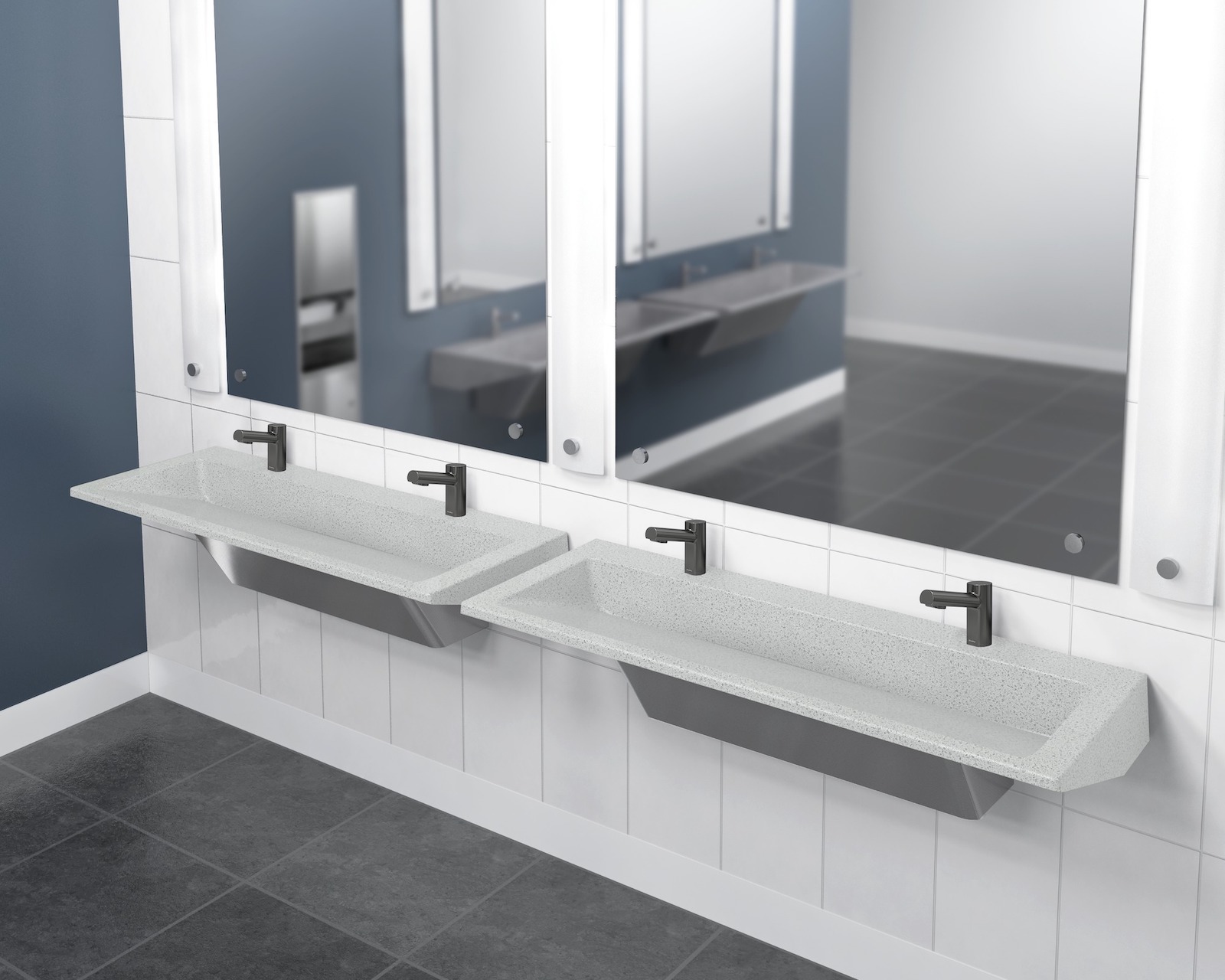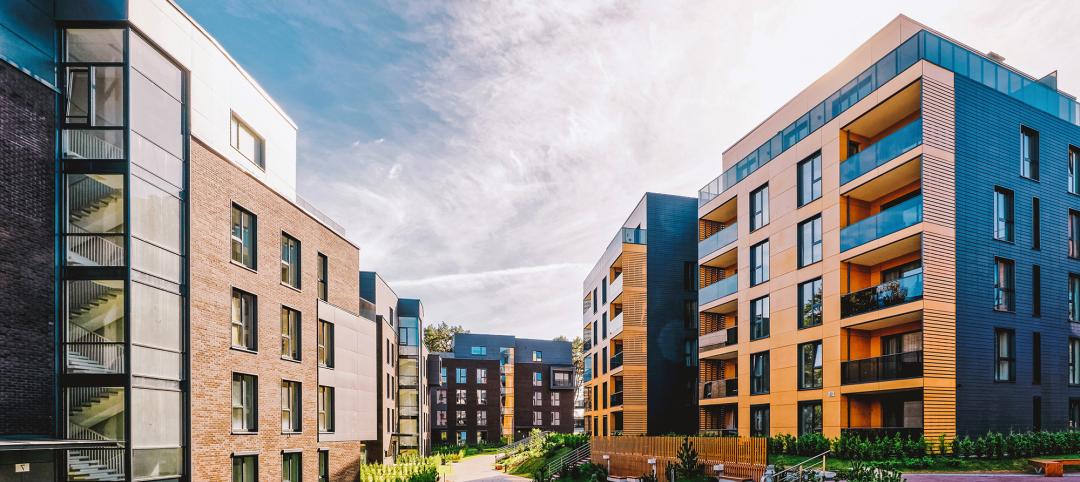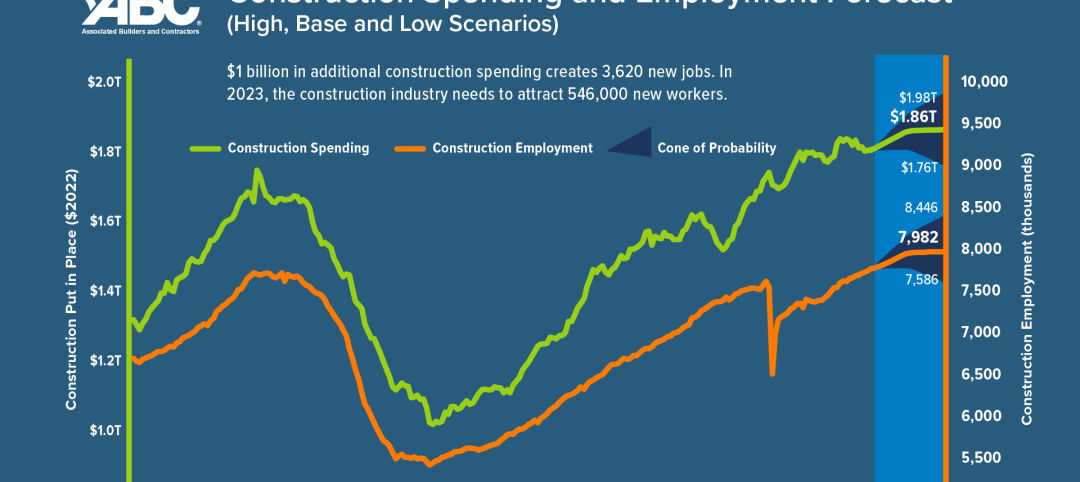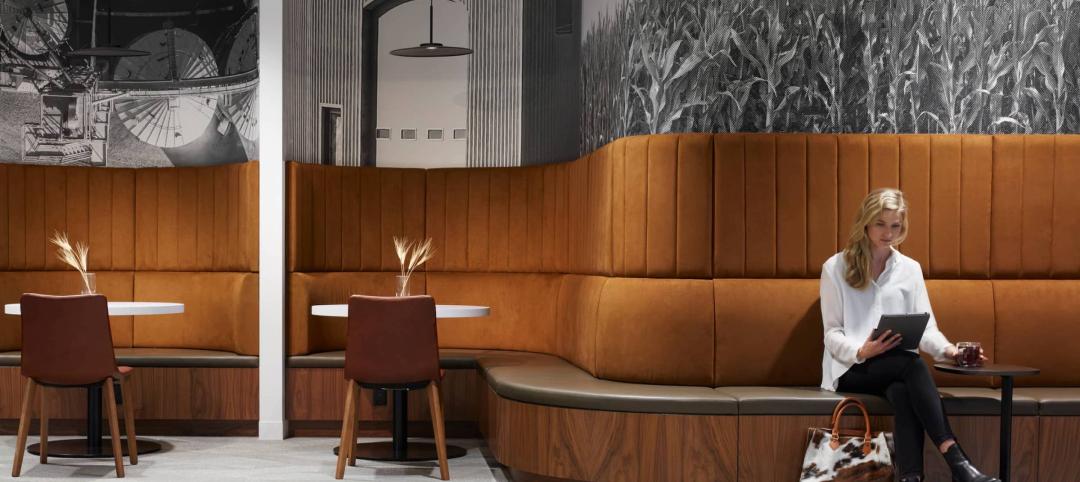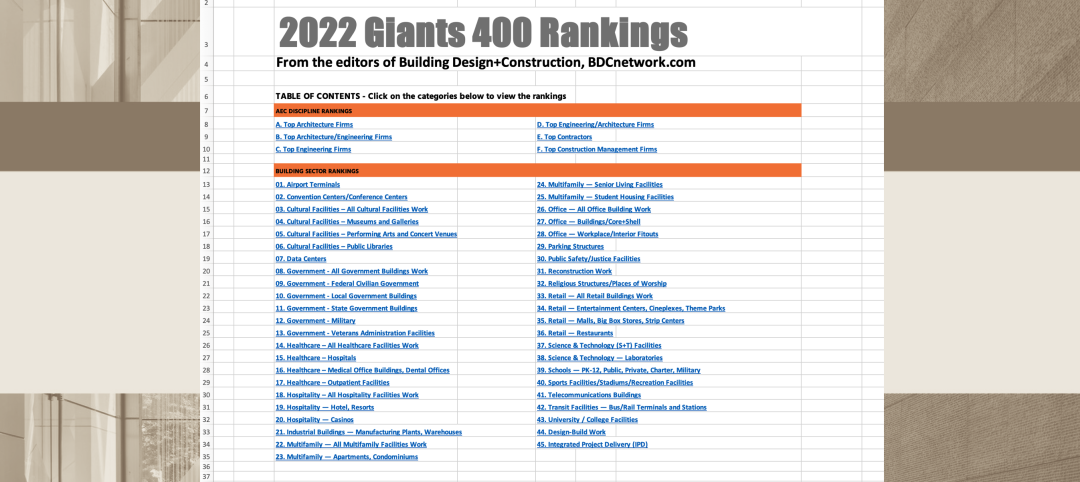Upon entering the third year of the pandemic, Americans are not only more sensitive to germs in public restrooms, they now hold higher standards for the cleanliness, condition and technology used in these shared spaces, according to the annual Healthy Handwashing Survey™ from Bradley Corporation conducted in January.
Despite ongoing Covid outbreaks, most Americans have not been deterred from using public bathrooms. In fact, 41% of Americans report using public restrooms as often as they did before Covid came on the scene. Interestingly, 27% say they use them more now than previously.
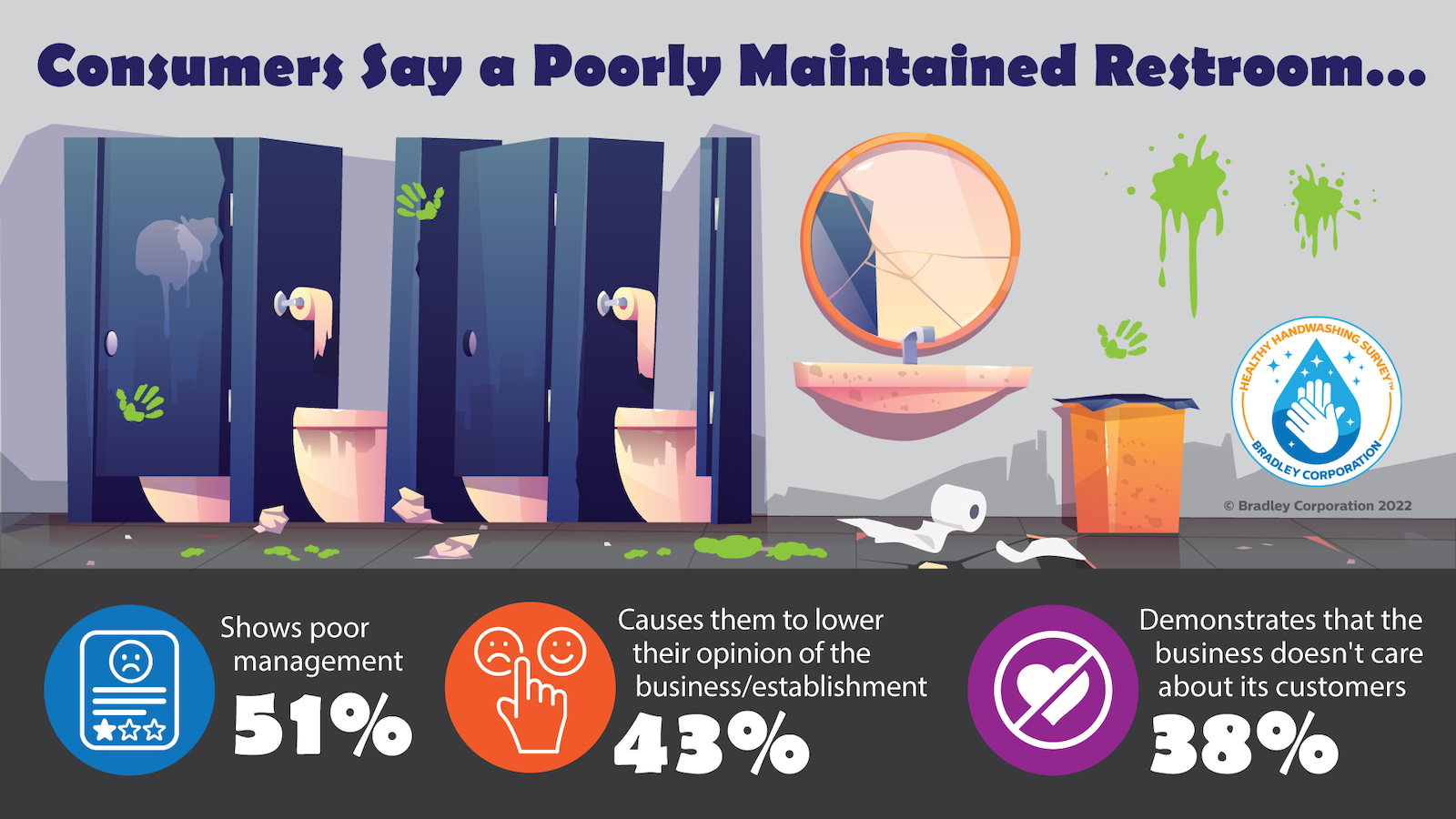
“Thanks to the pandemic, more people are paying closer attention to various elements in public restrooms – how clean they are, how easy they are to navigate without touching surfaces and how they can be improved,” said Jon Dommisse, vice president of marketing and corporate communication for Bradley Corp., a global manufacturer of commercial restroom equipment.
The survey, which has examined the state of U.S. public restrooms and handwashing habits for 13 years, identified key Covid impacts on how Americans view public restrooms – as well as the businesses and establishments that provide them.
#1 Restroom maintenance gets higher marks
A positive side effect of the virus is that half of the population believes public restrooms are now cleaner and in better condition than before Covid. More men (55%) give a thumbs up to the cleanliness of restrooms compared with women (47%).
“Prior to Covid, upwards of 70% of Americans reported having an unpleasant restroom experience,” Dommisse explained. “Evidently, increased cleaning protocols and stocking of supplies is being observed and appreciated by restroom users.”
Further, 79% think a posted and updated cleaning schedule in a restroom is important. “Signage goes a long way in helping to reassure visitors the facility is taking steps to ensure a clean environment and cares about keeping them safe,” he said.
#2 Unclean restrooms tarnish the overall business
Americans increasingly think poorly of a business when they encounter a messy restroom. In 2022, 51% of Americans say an unpleasant public restroom at a business shows poor management, up from 39% in 2021. Respondents also report that encountering neglected restrooms lowers their opinion of the establishment (43%) and shows the business doesn’t care about its customers (38%).
#3 Americans place high value on touchless restrooms
84% of Americans believe it’s important for public restrooms to be equipped with touchless fixtures and 63% say they are more likely to return to a business that offers no-touch capabilities in its restrooms.
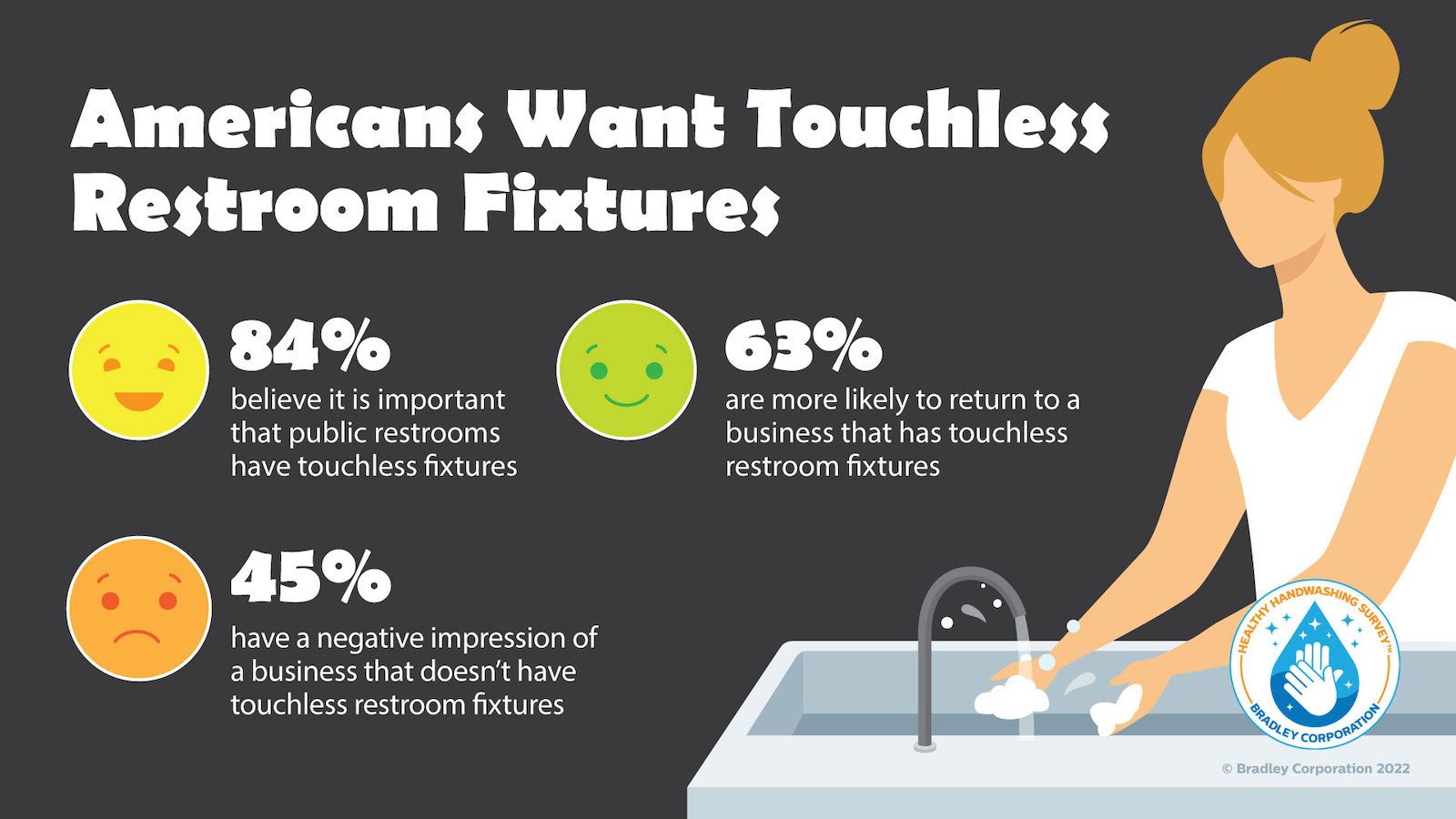
“In fact, Americans view touch-free technology as the number one feature that makes them feel safer from germs in restrooms,” Dommisse said. “Touchless features are also Americans’ most requested improvement in restrooms. More cleaning/restocking takes second place.”
Which touchless restroom features are considered most important? Respondents cite faucets, soap dispensers, flushers and restroom entrance doors as their top four.
#4 Consumers spend more money at a business with pleasant restrooms
Americans are willing to put their money behind restroom cleanliness. Almost 60% say they are likely to spend more cash at a business with clean, well-maintained restrooms. Another 58% say when out running errands they’ll take restroom breaks at a business they know has “good” restrooms.
#5 Coronavirus concerns persist, in general
The majority of Americans continue to be in an elevated state of germ consciousness, triggered by the coronavirus. While 89% of the general population felt more aware of germs in April 2020, that number has fallen to 78%. Northeasterners currently have the highest level of germ concerns (86%) while Midwesterners have the lowest level (72%).
“Certain types of facilities cause more trepidation about coming into contact with germs,” Dommisse added. “Specifically, Americans are most concerned about germs in stores (50%), medical facilities (39%), restaurants (34%) and gas stations (28%).”
The annual Healthy Handwashing Survey from Bradley Corp. queried 1,035 American adults Jan. 10-21, 2022, about their handwashing habits, concerns about the coronavirus and flu and their use of public restrooms. Participants were from around the country and were fairly evenly split between men (46%) and women (54%). For more information, visit www.bradleycorp.com/handwashing.
Related Stories
Multifamily Housing | Apr 4, 2023
Acing your multifamily housing amenities for the modern renter
Eighty-seven percent of residents consider amenities when signing or renewing a lease. Here are three essential amenity areas to focus on, according to market research and trends.
Sustainability | Apr 4, 2023
NIBS report: Decarbonizing the U.S. building sector will require massive, coordinated effort
Decarbonizing the building sector will require a massive, strategic, and coordinated effort by the public and private sectors, according to a report by the National Institute of Building Sciences (NIBS).
Multifamily Housing | Mar 24, 2023
Average size of new apartments dropped sharply in 2022
The average size of new apartments in 2022 dropped sharply in 2022, as tracked by RentCafe. Across the U.S., the average new apartment size was 887 sf, down 30 sf from 2021, which was the largest year-over-year decrease.
Multifamily Housing | Mar 14, 2023
Multifamily housing rent rates remain flat in February 2023
Multifamily housing asking rents remained the same for a second straight month in February 2023, at a national average rate of $1,702, according to the new National Multifamily Report from Yardi Matrix. As the economy continues to adjust in the post-pandemic period, year-over-year growth continued its ongoing decline.
AEC Tech | Mar 14, 2023
Skanska tests robots to keep construction sites clean
What if we could increase consistency and efficiency with housekeeping by automating this process with a robot? Introducing: Spot.
Industry Research | Mar 9, 2023
Construction labor gap worsens amid more funding for new infrastructure, commercial projects
The U.S. construction industry needs to attract an estimated 546,000 additional workers on top of the normal pace of hiring in 2023 to meet demand for labor, according to a model developed by Associated Builders and Contractors. The construction industry averaged more than 390,000 job openings per month in 2022.
Industry Research | Mar 2, 2023
Watch: Findings from Gensler's latest workplace survey of 2,000 office workers
Gensler's Janet Pogue McLaurin discusses the findings in the firm's 2022 Workplace Survey, based on responses from more than 2,000 workers in 10 industry sectors.
Architects | Feb 24, 2023
7 takeaways from HKS’s yearlong study on brain health in the workplace
Managing distractions, avoiding multitasking, and cognitive training are key to staff wellbeing and productivity, according to a yearlong study of HKS employees in partnership with the University of Texas at Dallas’ Center for BrainHealth.
Office Buildings | Feb 9, 2023
Post-Covid Manhattan office market rebound gaining momentum
Office workers in Manhattan continue to return to their workplaces in sufficient numbers for many of their employers to maintain or expand their footprint in the city, according to a survey of more than 140 major Manhattan office employers conducted in January by The Partnership for New York City.
Giants 400 | Feb 9, 2023
New Giants 400 download: Get the complete at-a-glance 2022 Giants 400 rankings in Excel
See how your architecture, engineering, or construction firm stacks up against the nation's AEC Giants. For more than 45 years, the editors of Building Design+Construction have surveyed the largest AEC firms in the U.S./Canada to create the annual Giants 400 report. This year, a record 519 firms participated in the Giants 400 report. The final report includes 137 rankings across 25 building sectors and specialty categories.


